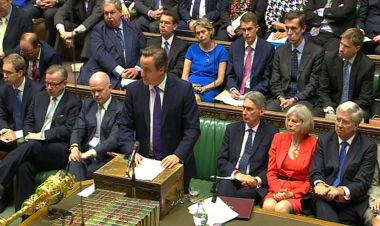ISIS debate: Justin Welby supports military action in Iraq

The Archbishop of Canterbury has backed military action in Iraq but he also urged British parliamentarians to "face the fact" that for some young Muslims, the appeal of Jihad is great than that of their life in the West.
Speaking in the House of Lords on the debate in Iraq, Justin Welby said Islamic State was just one example of a global phenomenon and it could not be tackled by military action alone.
He said that clearly, as had already been stated, "we do need to take this action now."
But he added: "It is also necessary, over time, that any response to ISIL and to this global danger be undertaken on an ideological and religious basis that sets out a more compelling vision, a greater challenge and a more remarkable hope than that offered by ISIL. We must face the fact that for some young Muslims the attractions of jihadism outweigh the materialism of a consumer society."
A struggle against a call to eternal values, however twisted and perverted they may be, was doomed to fail in the long term without a better story to offer.
Religious leaders must up their game and the church is playing its part, he said. "It is the role of the church I serve to point beyond our imperfect responses and any material, national or political interest to the message of Jesus Christ and the justice, healing and redemption that he offers.

"But in the here and now, there is justification for the use of armed force on humanitarian grounds, to enable oppressed victims to find safe space," he said. "The action proposed today is right, but we must not rely on a short-term solution on a narrow front to a global, ideological, religious, holistic and trans-generational challenge. We must demonstrate that there is a positive vision far greater and more compelling than the evil of ISIL and its global clones. Such a vision offers us and the world hope, an assurance of success in this struggle, not the endless threat of darkness."
Other church leaders urged the Government to stand against the "rhetoric" that the Islamic State can be bombed out of existence.
Leaders of the Baptist Union and the Methodist Church called for a broader political and economic strategy to tackle the IS terror ideology.
The churches also called for greater support for refugees from Syria and Iraq.
Rev Lynn Green, general secretary of the Baptist Union, the Rev Ken Howcroft, president of the Methodist Conference and Gill Dascombe, Vice-President of the Methodist Conference said in a join statement that the Government should treat with "extreme caution" any suggestion that IS could be defeated primarily through military action.
"An ideology - even one as dangerous and perverse as that of IS - cannot be defeated by the use of weapons. Military action could help to protect persecuted minorities and prevent IS from expanding its control in Iraq. But countering extremist violence in Iraq requires that Iraqis effectively address the underlying grievances that provided support for the rise of IS.
"The situation in Syria is more chaotic and the effectiveness of external military intervention less certain. Both nations face difficult challenges for which there are no easy solutions," they said.
While saying they were grateful that the Government has agreed to provide resettlement for some Syrian refugees, just a handful have been resettled in the UK.
"This does not even begin to scratch the surface of the level of need and further support must be extended to displaced people from both nations, in the UK and elsewhere. Meanwhile we welcome the contribution of the UK Government to the support of millions of displaced persons and refugees who remain in the region."
Christians on the Left, formerly the Christian Socialist Movement, called for Just War criteria to be applied.
The Just War tradition sets a series of tests to determine whether or not military action is acceptable, such as whether action is a last resort and whether the threat to innocent lives can be minimised.
Stephen Beer, spokesman, said: "There is a risk that the decision is simply between being for or against military action. However, we need to know what kind of military action is being planned and how it fits within an overall foreign affairs and defence strategy, assuming the government has one.
"The Just War tradition also requires us to have reasonable confidence that military action will cause less harm than it will prevent. At the very least, the government should be leading the way in providing increased humanitarian aid to the region on a sustainable basis."











